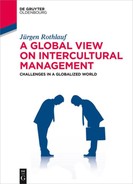Preface
The world becomes more and more global. Managers around the world are, or soon will be, involved to some degree in international business. The escalating level of international involvement and competition in today’s business areas requires that managers develop and improve their skills necessary for effective cross-national interactions and daily operations in foreign subsidiaries. Feedback from companies operating abroad reveals that expatriate failure is often caused by the ineffective management of intercultural relations, so the fate of expatriate missions depends at least in part on the international managers’ cultural skills and sensitivity.
The questions related to the right intercultural understanding and behavior are vital in order to be successful in an ongoing worldwide competition. The companies have to develop a strategy that is supportive in their efforts to work effectively and efficiently across borders. Today’s manager increasingly has to work in international and cross cultural environments. In addition to the normal pressures, managers are now required to cope with challenges, friction and misunderstandings emanating from cross cultural differences. Effective management in the modern environment demands cross cultural competency in order to make the best out of a multicultural team. Therefore a holistic approach that takes all intercultural aspects into consideration is absolutely necessary.
The aim of this book is to provide an excellent multicultural overview of the challenges we face today in the demanding arena of global business interactions. The book is a value-added primer for readers who need an orientation to varied business cultures. It allows readers to achieve a higher level of awareness of the requirements imposed by different cultural situations. Moreover this volume is geared to students of International Management as well as responsible practitioners of the same. Above all, however, it is aimed at management staff in the process of preparing for international assignments either for a private enterprise or in development-aid institutions.
A Comprehensive View on Intercultural Management – Challenges in a Globalized World is presented in nine chapters. Chapter 10 should enable readers to test their intercultural skills. A globality check, a test for global management skills and a crossword puzzle are waiting to get the right intercultural answers.
The opening chapter 1 explores business challenges encountered in global management and tries to underline the importance of Intercultural Management nowadays.
Chapter 2 deals with all facets of culture. Moreover a various cultural models are presented trying to provide a conceptual framework that enables companies and managers to assess relevant cultural variables and develop cultural profiles of different countries.
Chapter 3 focuses on corporate cultures and describes the seven cultural integration drivers that are helpful to become a successful player in an internationally challenging environment.
Moreover a look at Mergers & Acquisition aims at providing the reader to get a deeper insight into all important aspects that are relevant for doing business in a globalized world. The ability to deal constructively on an interpersonal level with cultural diversity and the multitude of attitudes and values will become a key qualification. Chapter 4 tries to give an answer how cultural business values differ and in which way values do influence multicultural organizations.
Everything we do across national and cultural borders, or within diverse societies, needs to take cultural differences into account. Chapter 5 is dedicated to present intercultural skills and attitudes that all belong to the wide field of intercultural competence.
Effective business communications are critical to the growth of every organization. Chapter 6 provides some good examples of how business introductions, telephone calls, presentations, and written communication can lead to an operation’s success or failure.
It is crucial for international managers to understand the influence of culture on decision-making styles and processes. Whenever somebody has to guide a team the relevant leadership qualifications are asked for. And there is no one single leadership style that fits to all intercultural challenges. How to behave properly is shown in chapter 7.
The ability to develop effective multicultural teams is essential in light of the increasing proliferation of foreign subsidiaries, joint venture, and other transnational alliances. Working in a multicultural team requires a set of skills that are quite different compared to a local team. Chapter 8 presents how a positive climate can be established and what sort of intercultural challenges are demanded in this context.
Chapter 9 focuses on intercultural preparation and reintegration. It centres on the necessity of training for cross-cultural interactions and discusses what global players can learn from our survey that was conducted in 2009 and which role the family has to play in the preparation for an international assignment.
Each chapter is accompanied by a case study and/or a role play. Moreover, students and other interculturally involved persons have asked experts about their opinions on different topics related to the intercultural world. Both, the questions and the answers conclude each chapter.
I do hope that the scope and the richness of the book, as well as the depth of its specific practical business situations, will help the reader to get a better intercultural understanding. Moreover, I would feel honored if some of my ideas will help readers to acquire the poise and confidence they need to be truly effective in doing business across cultures – both at home and abroad.
